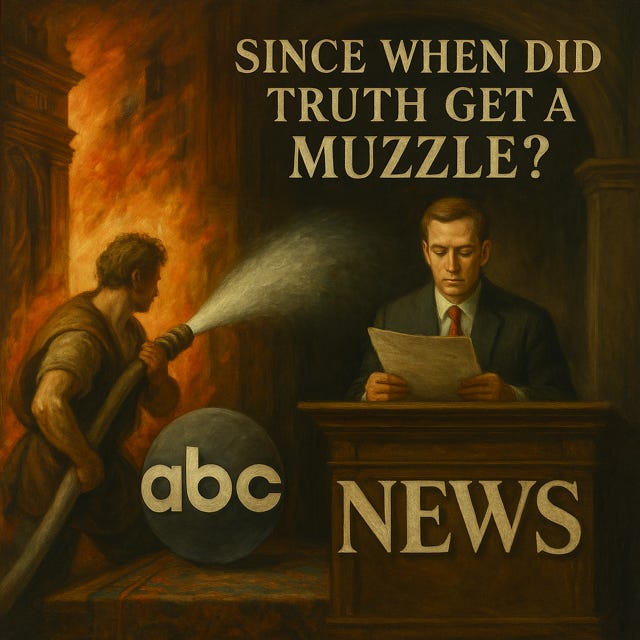Torchbearers of Truth Tested Again: The Ink of Conscience Is Pricier Than Ever Today
Cultural Updates Now Available Brought to you by HumanistFreeAudio

2025 just another year when groceries cost more than your first car, am I right? Not quite. It’s the year speaking the truth became more expensive than ever before. Eggs, milk, insurance…live on-air or on social media corrections and call outs are now luxury items in a society that mortgages integrity for convenience.
This is the world that journalist Terry Moran awoke to—microphone in hand, conscience fully loaded. When President Trump claimed MS‑13 tattoos as evidence that were clearly photoshopped, Moran did the unthinkable: he said, calmly and firmly, that’s wrong. Gasp! Truth mouth-to-mouth in a room running on spin and cynicism.
Then, on June 8, Moran took to X—Don’t Call It Twitter—with a voice loud enough to shake the accuracy-free walls of this Oval Office: saying Stephen Miller is: "a man who is richly endowed with the capacity for hatred," and called President Trump a "world-class hater." Unvarnished. Unapologetic. It didn’t cost him $5.99 at checkout—it cost him his job. ABCNews suspended him and—by June 11—refused to renew his contract, citing the sacred cow of neutrality.
Okay, let’s ask the question that’s been ducked, dodged, and drowned in euphemism: since when was the media supposed to be blindly neutral?
They are not monks. They are not court stenographers. They are not hired hands tasked with nodding along as reality is bulldozed.
They are—at least they were—supposed to report the truth. Not both sides of a fairy tale. Not the “narrative landscape.” The truth. And when a firehose of falsehood floods the airwaves—when conspiracy is served as policy, when cruelty is branded as clarity, when unconstitutional decrees are waved like parade flags—journalists aren’t obligated to provide equal time to the fire and the fireman.
They’re supposed to sound the alarm.
You cannot ethically “both sides” a bonfire. You cannot compare a verified fact to a hysteric hallucination and call it balance. If one side says it’s raining, and the other says there are Jewish space lasers sending fake precipitation down or causing wildfires, or both, the job isn’t to quote both—it’s to stick your bloody hand out the window and tell us the weather.
But instead, the suits have declared: neutrality above all. Even when neutrality means pretending a burning house and a bucket of water deserve the same headline. Even when it means silencing the journalist who dares to say: “There’s arson here.”
If your newsroom would’ve fired Edward R. Murrow, you’re not neutral. You’re neutered.
And in a moment like this—truth doesn’t need a chaperone. It needs a megaphone.
Not the First: The Lineage of Dissent

This wasn’t career drama. It was a public un-broadcast. Inflation was a nonstop topic for four years even though it was a world systemic problem post-centennial (hopefully) pandemic, so what’s the value of moral clarity when it’s priced out of culture?
Truth is getting more expensive—sometimes more stuff can’t compete with the price on your conscience.
Moran didn’t invent this fate. He’s part of a millennia lineage of truth-tellers—from Florentine piazzas to Parisian plazas—who dared to name reality when power demanded silence.
Marsilio Ficino (1433–1499): Florence’s Philosopher-in-Chief
Born in the Florentine countryside, son of a physician, drawn to ancient philosophy like a moth to flame: Ficino became the Catholic priest who dared to say: “I believe—and with no empty faith—that we are of divine origin.” Through his translations, he made Plato speak Latin forging the soul’s immortality into the bedrock of Renaissance thought breathing new life into stale Western scholasticism. Under Medici patronage, he led a spiritual and philosophical revival that fused Christian faith with Platonic insight—challenging superstitious rigidity. Authorities whispered of heresy, his ideas flirted with forbidden magic, and he walked a tightrope over doctrinal dread. But he didn’t stop. He created the Platonic Academy and insisted that the soul—reason—love—chose liberty over fear.
His masterpiece, Platonic Theology (1482), argued that: “were the soul not immortal, no creature would be more miserable than man.” With books in hand and holiness behind him, he challenged scholastic dogma and Inquisitors alike.
Like Moran in the Oval Office, Ficino faced doctrinal bullies with quiet power—his pen an arc, his platform: The Medici. He awoke souls when sleep was more socially accepted. This was especially true during Savonarola's reign of terror, we know it today as: The Bonfire of the Vanities. Ficino dared to wield philosophical rigor against the entrenched orthodoxy of his time. Truth over convenience. Fear over flight.
Pietro Aretino (1492–1556): The Satirist Who Cut Deeper Than Taxes
From humble beginnings in Arezzo, Aretino became a self-made storm. He proclaimed: “I am the divine Aretino, scourge of princes, support of the poor, protector of the oppressed.” Aretino carved his name into the world with satire sharp enough to slice through marble.
Courted by kings and cardinals, feared by popes and princes, he never let power hush his laughter. Aretino’s pen was a scalpel. With savage wit, he exposed hypocrisy in the church, the courts, the papacy, even The Medici. His satires sent shockwaves. He was threatened, exiled, censored—but he never shut up.
When he attacked Emperor Charles V’s vanity in letters dripping with satire, he didn’t hide—he sold himself as a thorn in Europe’s side. His laughter was a declaration: no throne can hold a conscience that laughs.
Like Moran, he named ugliness publicly. Named hate. Named fraud. Aretino’s courage came in the form of ridicule—but he revealed the rot. Moran did the same with his X post. Satire or social media, the weapon remains truth, flung without apology.
Tommaso Campanella (1568–1639): Utopian Dreams in a Dungeon Cell
Campanella—Dominican friar, revolutionary believer—was born in Calabria’s mountains but dreamed of celestial cities. His passion for philosophy was matched only by his refusal to let church or king cage the human mind. Campanella’s City of the Sun was thought to be fantasy, but he saw it as much truer than fiction. So did his adversaries.
Campanella spent 27 years and brutal torture housed in a Spanish Napolese dungeon after advocating that vision. He argued: “Truth can be hidden and persecuted…but it cannot be held prisoner by injustice. In the end it emerges from the darkness.”
He wrote, “Even in chains, the mind roams free”, and with that same line, he tied his salvation to his unbending words—not sandals or shackles .
Moran’s professional exile is bloodless and—so far—prison-less. Both cages feed cowardice. Both must be refused, even if ideas can live in any cage.
Giordano Bruno (1548–1600): The Infinite Soul’s Martyr
Giordano Bruno was a Dominican friar who refused to let his faith stifle his mind. A brilliant memory artist, he could recite whole books—and dared to declare that the universe itself was endless, a shimmering sea of worlds. Bruno announced: “there are countless suns and infinite worlds…,” subverting the cosmos under dogmatic rule.
The Church burned him alive in Rome’s Piazza Campo de’ Fiori. His final words before fire? “Perhaps you pronounce my sentence against me with greater fear than I who receive it”—a thunderbolt to inquisitors.
The Church’s pyre silenced his breathing body—but could not extinguish his voice. Bruno died for daring to speak cosmic truth. Moran lost his seat for daring to speak moral truth. One paid in blood. The other in culture. But both died in their own ways—and both planted seeds. Moran lost his broadcast booth—but let’s be clear: one builds minds and the other silences them.
Étienne Dolet (1509–1546): The Printer’s Pyre
Born in Orléans, Étienne Dolet became translator, printer, and philosophical thunder. He believed that ideas belonged to all, not to bishops or barons. He flooded the Parisian book stalls with words that sparkled like lightning—uncompromising, direct, defiant. Dolet believed in paper as a vessel of conscience. He said: “printing is the mind alive in types.” For that, they declared him an atheist and burned him in 1546, with his books on the pile.
His last words were a prayer that printing would outlive the pyre. Today, Moran has a digital platform—but the pyre’s been replaced by layoffs, contract cancellations, quiet silences. In each case, the world learned: power fears the pen—whether ink or algorithm.

Let’s Set The Record Straight Again
1. Truth isn’t neutrality.
To call hate “hate”—that’s moral clarity, not bias. Ficino called false idols false. Moran called hate hate. That’s speaking truth, not choosing sides.
2. Silence shrinks society.
Every time a truth-teller is silenced, we lose something real. Democracy doesn’t shrink—it gets shuttered.
3. Modern prisons wear suits.
No dungeon, no pyre. Just contract-outs and NDAs. These are blockades. Soft, insidious, and effective.
4. Legitimacy outlasts punishment.
Ficino lit Renaissance sparks. Bruno’s embers ignited scientific freedom. Moran will light underground rooms and journalism school lecture halls.
5. We are the next firewatchers.
It’s not enough to admire these giants. We are the keepers of the flame now.
What We Must Do
Defend moral clarity. Don’t let “objectivity” be a weapon against conscience. Teach our lineage. Let classrooms echo with voices of Ficino, Aretino, Campanella, Bruno, Dolet—and Moran. Support the brave. Donate, amplify, challenge. If a voice costs nothing to boost, don’t cheapen it. Track institutional values. If they claim fairness, hold them to it—even when it’s uncomfortable. Speak no matter what. Say it loud, say it clear: we refuse silence.
Inflation is real. The cost of living is sky-high. But moral clarity? That’s the inflation we should worry about. Eggs and milk are expensive, but so is a conscience that costs you your job.
Terry Moran stands with guys like Ficino, Aretino, Campanella, Bruno, and Dolet—each refused the payoff for silence. Because once silence is cheaper, tyranny is cheaper too.














I have a dear friend who works at CNN. She cannot attend a protest for her own rights or even donate to a candidate for fear of being considered "biased."
Demanding an employee's false neutrality is as crushing as demanding fealty to a creed to which one does not actually subscribe.
Another very suspicious ares of false neutrality is within the couples' counseling industry. Sometimes there is a guilty party and an innocent party. The 50%-blame-for-each-party script that the industry has been guilty of for over 45 years is just as intentionally blind as insisting journalists not-say what they have, in fact, observed.